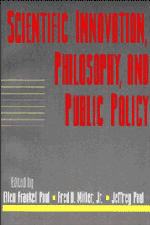Book contents
- Frontmatter
- Contents
- Introduction
- Acknowledgments
- Contributors
- The Human Genome Project: Research Tactics and Economic Strategies
- Choosing Who Will Be Disabled: Genetic Intervention and the Morality of Inclusion
- Germ-Line Genetic Engineering and Moral Diversity: Moral Controversies in a Post-Christian World
- Self-Critical Federal Science? The Ethics Experiment within the U.S. Human Genome Project
- When Politics Drives Science: Lysenko, Gore, and U.S. Biotechnology Policy
- Biotechnology and the Utilitarian Argument for Patents
- Property Rights Theory and the Commons: The Case of Scientific Research
- Property Rights and Technological Innovation
- Medicine, Animal Experimentation, and the Moral Problem of Unfortunate Humans
- A World of Strong Privacy: Promises and Perils of Encryption
- Computer Reliability and Public Policy: Limits of Knowledge of Computer-Based Systems
- Responsibility and Decision Making in the Era of Neural Networks
- Preposterism and Its Consequences
- Index
Medicine, Animal Experimentation, and the Moral Problem of Unfortunate Humans
Published online by Cambridge University Press: 04 August 2010
- Frontmatter
- Contents
- Introduction
- Acknowledgments
- Contributors
- The Human Genome Project: Research Tactics and Economic Strategies
- Choosing Who Will Be Disabled: Genetic Intervention and the Morality of Inclusion
- Germ-Line Genetic Engineering and Moral Diversity: Moral Controversies in a Post-Christian World
- Self-Critical Federal Science? The Ethics Experiment within the U.S. Human Genome Project
- When Politics Drives Science: Lysenko, Gore, and U.S. Biotechnology Policy
- Biotechnology and the Utilitarian Argument for Patents
- Property Rights Theory and the Commons: The Case of Scientific Research
- Property Rights and Technological Innovation
- Medicine, Animal Experimentation, and the Moral Problem of Unfortunate Humans
- A World of Strong Privacy: Promises and Perils of Encryption
- Computer Reliability and Public Policy: Limits of Knowledge of Computer-Based Systems
- Responsibility and Decision Making in the Era of Neural Networks
- Preposterism and Its Consequences
- Index
Summary
INTRODUCTION: THE USE OF ANIMALS FOR HUMAN BENEFIT IN MEDICINE
We live in an age of great scientific and technological innovation, and what seemed out of the question or at least very doubtful only a few years ago, today lies almost within our grasp. In no area is this more true than that of human health care, where lifesaving and life-enhancing technologies have given, or have the enormous potential in the not so distant future to give, relief from some of the most terrible human illnesses. On two fronts in particular, xenograft or cross-species transplantation and genetic engineering of animals on behalf of gene therapy in humans, such relief appears very promising, if not actually on the horizon. Certainly, extensive research work on both fronts is underway both in the United States and abroad.
These uses of animals for human benefit occur, however, in an intellectual and ethical environment in which scientists and technicians engaged in animal research are increasingly on notice, both from within and without their ranks, that the very trade-off upon which their work depends, namely, animal sacrifice for human gain, is once again under moral scrutiny. As moral beings, the rest of us, who accept the benefits that animal research confers, have an interest in what this moral scrutiny uncovers. This is especially true of those, such as myself, who support (much of) animal research and wish to see its benefits for humans continue.
- Type
- Chapter
- Information
- Scientific Innovation, Philosophy, and Public Policy , pp. 181 - 211Publisher: Cambridge University PressPrint publication year: 1996



